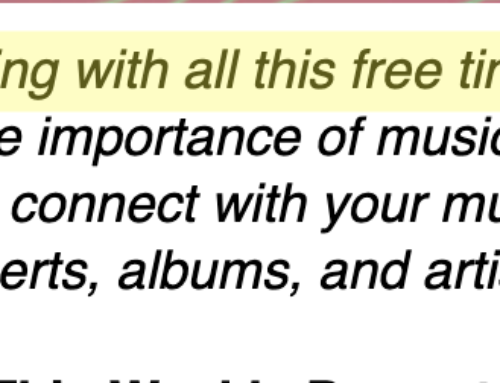While it’s technically not my first speaking engagement for 2013 (though it is the first public one), I am anticipating xPotomac (Feb. 25 in DC) rather eagerly. With some trepidation as well, but definitely anticipation too.

Disclosures: In addition to speaking, I’m also working with Geoff Livingston and Patrick Ashamalla on promoting the event, which means I have a vested interest in getting people there. But – BUT – I wouldn’t be working on it/have accepted the invitation to speak if I didn’t think it was worth it. Also, Geoff took this beautiful panoramic photo of the theatre when we were there a couple of weeks ago.
The topic Geoff asked me to speak on is quite interesting, and one that I’ve ranted expounded on before: social scoring. Here’s a Listly list I’ve pulled together on several of the posts that have run on Waxing UnLyrical over the last few years on social scoring & social media influence:
[listly id=”358″ layout=”full”]
Side note: Some of you are way ahead of me on using Listly. I have only recently started experimenting with it – in part because last year was such a crazy year I didn’t have time to play with and learn about cool new platforms – and so far, at least, I like it very much. If you’ve created neat Listly lists the WUL community and I should know about, please leave the URL(s) in your comment below!
As you can see, I’m not a fan of social scoring, at least the way the majority of people seem to like to use it and talk about it.
Because, when it comes to deciding whether or not I want to get to know you, work with you, have dinner with you, meet you at a conference, etc., I could give a rat’s behind as to what your ____ score is (I don’t want to beat up on any one platform in particular, I’ve done that enough already).
Where does real influence come from?
The people you know and trust; or know of enough to trust because the people you do know say they’re good eggs.
I’ll say it again: “the people you know and trust.” And no matter how truly influential someone is (in real life, I mean) there are people they know and trust who have abysmal social scores.
For example, do you think Michelle Obama cares what social scores her best friend(s) have? They’re probably not even on Twitter.

For example, Ann Wylie influences me on the topic of writing and communication, because I’ve met her (I adore her), she has proved that she owns her craft, and therefore, I trust her. And her social score will not give you anywhere near a true value of her influence on people like me.
I said as much when Geoff asked me to contribute to a post on the subject.
What’s your number?
However… we live in a world which is growing explosively. Perhaps because of our collective rate of growth, we have no option but to look at each other more and more as numbers, or statistics, or ratios.
Because we do. How many of us have never had a thought such as one of these, or one that’s similar:
X is more likely to help me get a better job than Y, therefore I should pay more attention to X.
G put me on her top 50 list of blogs, so I’m a rockstar.
Since T has a ____ score of 58 and mine is 65, I’m better.
What’s the reality behind such thoughts?
#1: If that’s the only reason you pay attention to people, then you’re a D-bag and don’t deserve any help.
#2: You may/may not be a rockstar, but your work will define that. List are subjective. What makes G an authority?
#3: Idiot.
Adding context and community
I do think social scoring has a place in our marketing efforts; just not the only one. Use it as one factor in determining who you’re going to reach out to. Use it to help you narrow down the areas people are influential in (but do the rest of your homework as well). Use it as part of your strategy but not as your measure of success.
And if/when social scores are going to help, it will be a) if you already have a smart strategy into which you’re incorporating social scoring, and b) when your “citizen influencers” don’t just create volumes of content but are able to effect action among their communities.
That last “C” word is key. Last year, Jay Baer did a terrific interview with Mark Schaefer on his book, Return on Influence, and you should read both.
In a recent guest post for PRSAY, I wrote that I think 2013 is the year we are going to see increasing adoption of community management principles and methodologies in the field of public relations. Social has become such a crowded medium, we simply have to find a way to cut through the noise.
And what does that mean?
That we’ll depend more and more on our communities to help get the word out… which means that the community – comprised of people with low and high social scores – is what is going to start becoming truly influential.
Now, three things:
1. I would love to chat with you on the subject, so if you’re in the DC area on Feb. 25, come spend the day with us at xPotomac, at the Source Theatre. Tickets are moving steadily, and with a capacity of only 114 (seriously, this isn’t a fake number), the event should sell out soon. And there are people far smarter and more interesting than me speaking, such as Andrew Keen, Vanessa Fox and Dino Dogan.
If you want to come, use the discount code Speaker for 50% off (the education and nonprofit rate tickets have already sold out).
2. Geoff Livingston, who also recently co-authored Marketing in the Round with Gini Dietrich, will be the guest on tomorrow’s #measurePR Twitter chat (12-1 pm ET). So if you have questions for him, please can you leave them in the comments below?
3. What do you think? Do you think I’m on the right track? What is your opinion of social scoring? And don’t forget to share your Listly links in the comments, please!









[…] The potential to reach and engage with their audience, which should be aligned with your target […]
[…] 5. Context and Community: the 2 Cs That Can Make Social Scoring Work […]
[…] 5. Context and Community: the 2 Cs That Can Make Social Scoring Work […]
[…] Context and Community: the 2 Cs That Can Make Social Scoring Work (waxingunlyrical.com) […]
[…] Context and Community: the 2 Cs That Can Make Social Scoring Work (waxingunlyrical.com) […]
Well clearly I’m a bit biased on this topic, so… ;-)
I’ve always seen social scoring as the stepping pint to influence (as far as identification of influencers goes). Are the platforms perfect? Heck no. Do they offer context? Not really. However, they do offer an “in” as an early identification system prior to the real legwork beginning.
There are way too many factors at play – situation, locale, peer, personal, emotional, professional, etc, that can disrupt the message of an “influencer”, especially when trying to push that message at a large scale.
The real context comes from micro and macro influencers, and the situational factors around these people. That’s where the real conversation can start.
Danny Brown Tru dat. Thank you for coming by and I apologize for not being able to swing by myself before this.
Love this, Shonali. Firstly, you’re hilarious. You had me at “Rats behind” :). The examples you gave painted a really bold picture of influence and how subjective it can be. We have done a few webinars on influence and try to keep people from falling into the numbers trap. If someone has 100 followers and they’re the RIGHT 100 followers, you are connected with your target audience.
Needless to say, I think you’re on-track, and especially agree with your opinion that social scoring does have a place in our marketing efforts, just not the only one. I wonder if social scores are popular because it masks itself as a simple way to measure. We know by now that nothing good comes easy :)
I wish we could make your talk at xPotomac; we know you’ll rock it ;) Hope to see you soon!
Best,
Lisa
PS. We are not yet on Listly but do follow its co-founder Nick Kellet on Twitter (@NickKellet) and enjoy his content. I also saw him at IMS and he had some great questions during a panel :)
Cision NA I’d love to meet NickKellet IRL one day!
Shonali this is exactly what I needed for my C-Suite. They dismissed me when I said Klout means nothing, I will send this over to them immediately. Thank you, you nailed it!
jennimacdonald Since context is so important :D… What is your relationship to the C-Suite in this case? Are you the owner? A manager directly below?
I’m curious to know how you are using the piece (as well as how it works out, so keep us in the loop!).
Daniel J. Cohen I’m the social media director at Engage121, we integrate Klout scores into our application so you can see your follower’s score. I made the point that Klout scores don’t matter, some didn’t see my point. This article helps! I emailed it to those I was discussing Klout with.
jennimacdonald I’m so glad it was useful! You know, I think we are all in such a hurry to put things in boxes so that we can check “done” off a list, we welcome solutions like this… except they’re not really solutions. I don’t blame people for wanting a quick solution – but the problem is that there is no one-stop-shop approach to this! I wish they would realize that…
Love the post. I’ve long thought this about Klout (I can punch a network… I have a few “mean points” leftover I guess :)).
Any time we assign quantitative measurements to rather unmeasurable concepts, we get into trouble. The stock market is a good example. Setting the value of a dollar so we can all agree on it and trade is one thing, but using an algorithm to predict the future? Never works.
And the same can be said influence… except it’s even murkier, because we aren’t sure the current number is accurate in the first place without performing a series of overly complex, rather impossible tests.
I think this is a step in the right direction. “Influence among WHO or with WHAT?” is a key question here. If I NEED to land ONE client for my non-profit, and no one else will do, that person has the highest possible influence score in that moment.
Daniel J. Cohen Exactly. Context is everything. Did you ever get into Empire Avenue, btw?
Shonalii Can’t say I have… But I did just Google it. :) Anything to know before I do a deep dive?
Daniel J. Cohen Well… I’d be interested in your take on it. Personally I couldn’t wrap my head around it, though I tried hard to.